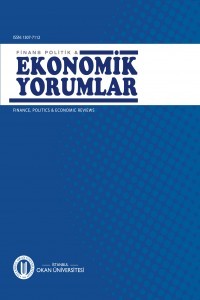Tam Öğrenme Modeli İlkeleriDoğrultusunda Geleneksel MuhasebeEğitiminin Değerlendirilmesi
Eğitim olgusu, sıklıkla eğitim sürecine eğitimci ve öğrenci olarak katılanlar; öğretmenler ve öğrenciler, çocuklar ve gençler, anaokulu öğretmen ve bakıcıları, çıraklar ve ustalar, anne-babalar ve okul yöneticileri vs. ile ilişkilendirilmektedir. Eğitim denildiğinde ilk akla gelen, eğitici ile eğitilenler arasındaki kişisel ilişkiler olmaktadır. Ancak, eğitim her şeyden önce, insanoğlunun bugünkü ve yarınki yaşamını şekillendiren müdahaleleri içeren bir süreçtir. Eğitimin müdahaleleri içeren bir süreç olmasından dolayı yıllar içerisinde çeşitli eğitim anlayışları geliştirilmiştir
Anahtar Kelimeler:
Muhasebe eğitimi, tam öğrenme modeli
Evaluation of Accounting Education According to Bloom’s Mastering Theory
The educational background is often the participants of the educational process as educators and students; teachers and students, children and young people, kindergarten teachers and caregivers, apprentices and masters, parents and school administrators etc.. When it comes to education, there are personal relationships between the educator and the educated who come to mind first. However, education is, first and foremost, a process involving interventions that shape the life of man today and tomorrow. Since education is a process involving interventions, various educational insights have been developed over the years
Keywords:
Accounting education, mastery learning,
___
- ALTINAY TARAKCIOĞLU, Ayşenur; (2016), Lisansüstü Düzey
- de Muhasebe Eğitimi, Türkiye’de Muhasebe Eğitimi, Ekin Yayınevi.
- BLOCK, James H.; (1971), Mastery Learning: Theory and Practice. New York : Holt, Rinehart and Winston, 1971, s. 47- 63.
- BLOOM, Benjamin S.; (1968), Learning for Mastery. Instruction and Curriculum. Regional Education Laboratory for the Caroli- nas and Virginia, Topical Papers and Reprints, Number 1. Chi- cago Univ., Ill. Dept. of Education.; Regional Educational Labo- ratory for the Carolinas and Virginia, Durham, N.C., s. 1-14.
- ERGÜN, Mustafa; (2009), Eğitim Sosyolojisine Giriş, Nadir Ki- tabevi.
- FACIONE, Peter, A. (1990), Critical Thinking: A Statement of Expert Consensus for Purposes of Educational Assessment and Instruction, “ The Delphi Report”, California Academic Press.
- HESAPÇIOĞLU, Muhsin; (2011), Öğretim İlke ve Yöntemleri, Genişletilmiş 7. Baskı, Nobel Yayınevi.
- KÖKSAL, Onur ve ATALAY, Bünyamin; (2016), Öğretim İlke ve Yöntemleri, Eğitim Kitabevi.
- KÜÇÜKAHMET, Leyla; (2015), Öğretim İlke ve Yöntemleri, No- bel Yayınları.
- MUELLER, Daniel J.; (1976) “Mastery Learning : Partly. Boon, Partly Boondoggle”, Teachers College Record, 78 : l, s. 43-52. SENEMOĞLU, Nuray; (1987), Tam Öğrenme Modeli, Yararlılıkları ve Sınırlılıkları, Eğitim ve Bilim Dergisi, C: 12, S:66.ss. 28-34
- SERÇEMELİ, Murat, KURNAZ, Ersin ve ÖZCAN, Muhammet; (2015), “Y Kuşağı Öğrencilerinin Muhasebe Eğitimine Bakışı: Atatürk Üniversitesi İİBF’de Bir Araştırma”, Süleyman Demirel Üniversitesi İİBF Dergisi, Y: 2015, C: 20, S: 1, ss. 261-276.
- SEVİLENGÜL, Orhan; (1996), Genel Muhasebe-Tekdüzen Mu- hasebe Sistemi İle Uyumlu, Gazi Kitabevi, 5. Baskı, Ankara.
- UZAY, Şaban., TANÇ, Ahmet ve ERCİYES, Mehmet; (2008), “Türkiye’de Muhasebe Denetimi: Geçmişten Geleceğe”, Mali Çözüm Dergisi, S:95, ss. 125-140.
- VARIŞ, Fatma; (1978), Eğitim Bilimine Giriş, Ankara Üniversi- tesi Eğitim Fakültesi Yayınları, No: 78, Ankara.
- YÜCENURŞEN, Mehmet, BEZİRCİ, Muhammet, ÖZPEYNİRCİ, Rabia ve PEKER, Aykut.A.; (2016), “Muhasebe Eğitimi ve Ka- lite Boyutları: Türkiye Alan Araştırması”. International Journal of Human Sciences, C:13, S: 1, ss. 296-319.
- ISSN: 1307-7112
- Başlangıç: 1963
- Yayıncı: İstanbul Okan Üniversitesi
Sayıdaki Diğer Makaleler
Ekonomi Okuryazarlığı: AmasyaÜniversitesi’nde Bir Araştırma
Tam Öğrenme Modeli İlkeleriDoğrultusunda Geleneksel MuhasebeEğitiminin Değerlendirilmesi
N. Savaş DEMİRCİ, Deniz ÖZYAKIŞIR
İlgili Pazarın Tespitinde Kullanılan Kantitatif Yöntemler ve Güncel Uygulamalar
